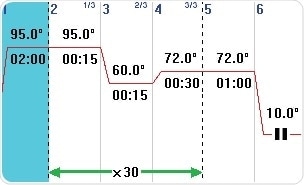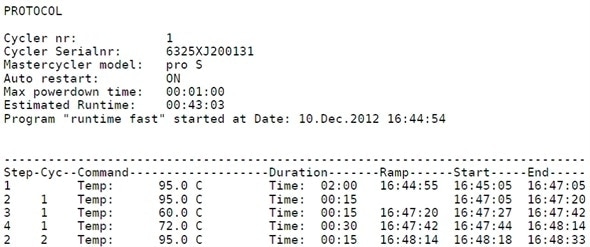Introduction
In order to compare various thermal cycler speeds, it is not enough to take into account only the heating ramp rate and cooling ramp rate available in the technical specifications, as these data do not give a picture of the actual run times.
Estimating the actual run times as per these ramp rates may result in incorrect conclusions. The Mastercycler® nexus GSX1 and the Mastercycler® pro S, as predicted from their rapid ramp rates, realized the shortest PCR run times. However, for the thermal cyclers made by other manufacturers, slower run times were noted even though they had similar ramp rates.
The common thermo cycler technical details include the thermoblock ramp rate, besides temperature homogeneity and control accuracy. Instead of following a uniform standard for the ramp rate, manufacturers specify various other parameters including:
- maximum heating rate and cooling rate
- average ramp rate
- maximum ramp rate
- maximum sample ramp rate
Therefore, the user has to rely on these diverse parameters for the estimation of actual ramp rates. This article deals with the comparative analysis carried out for evaluating whether the ramp rate parameters given in the technical specifications are helpful for the estimation of total run times of the PCR applications on thermal cyclers.
Materials and methods
25μL water was filled in a 96-well plate (Eppendorf twin.tec® PCR Plate 96, low profile) in 48 different positions (Figure 1).

Figure 1. Positions indicated in black of the 96-well PCR plate were filled with 25μL water each.
Next, the plate was sealed by utilizing the Heat Sealing PCR Film (Eppendorf), and centrifuged for a period of 1 minute at 500-1000xg. Subsequently, the plate was kept in the thermal cycler, and a standard 3-step PCR program was run (Figure 2).

Figure 2. 3-step PCR program for run time determination. A - Start of run time measurement; B - End of run time measurement.
The run times were noted for the Mastercycler® pro S, Mastercycler® nexus gradient, Mastercycler® nexus GSX1, and Mastercycler® nexus, and eight other thermal cyclers made by competing manufacturers. The lowest volume setting and/or quickest ramping speed were selected for instances in which the relevant thermal cycler software permitted reaction volume settings or varying temperature control modes.
The total run time was immediately measured, after starting the first temperature step, and was brought to an end as soon as the temperature of the last step was reached. The total run time after the completion of the run was noted, by referring to the records, for those thermal cyclers recording and saving a detailed run protocol.
Detailed, exportable run protocols as pdf files after the run were obtained (Figure 3), for the purpose of documentation, for Mastercycler pro and Mastercycler nexus Models, and three other competing thermal cyclers.

Figure 3. Screenshot from a Mastercycler pro run protocol, exported as pdf file, from the instrument software (additional information, e.g. user, program details and additional cycler settings, is not displayed in this section).
Results and Discussion
The ramp rate assessments specified by the manufacturers when compared with the empirically calculated run times revealed that taking into account only the ramp rates based on the technical data is not appropriate for a correct estimation of an actual PCR program run time (Table 1).
Table 1. Total run time of a standard 3-step PCR protocol using the fastest settings possible in the instrument software. Due to diverse manufacturers’ statements of ramp rates, only the maximum ramp rate which could be found according to the technical data for an instrument is presented here.
|
Thermal Cycler
|
Run time
[hh:mm:ss]
|
Ramp rate
accord. to techn.
data [°C/s]
|
|
Mastercycler pro S
|
00:40:12
|
6
|
|
Mastercycler nexus GSX1
|
00:42:31
|
5
|
|
C
|
00:46:50
|
5
|
|
P
|
00:48:58
|
5
|
|
S
|
00:50:31
|
6
|
|
Mastercycler nexus Gradient
|
00:51:26
|
3
|
|
Mastercycler nexus
|
00:51:53
|
3
|
|
V
|
00:52:22
|
5
|
|
T
|
00:53:20
|
4
|
|
R
|
00:56:27
|
5
|
|
G
|
00:56:38
|
3.5
|
|
A
|
01:03:13
|
3
|
The Mastercycler nexus GSX1 and Mastercycler pro S thermal cyclers, having silver block, showed the least total PCR run times, as per the fast, cited ramp rates. The PCR run times of thermal cyclers made by certain competing manufacturers were significantly longer than the cited ramp rates. It is apparent that the V, T and R thermal cyclers were slower in their individual PCR run times as compared to the Mastercycler nexus and the Mastercycler nexus gradient, despite their fast, cited ramp rates.
The observed discrepancies were assumed to be due to the parameters given below:
- The maximum ramp rates, cited in the technical specifications of the competing thermal cyclers, are reached in varying periods of time during ramping from one temperature to the next temperature, but only for a short time in each ramping phase.
- Reaction volume settings and temperature control modes also affect the ramping behavior. This can even result in re-optimization of a reaction, after the PCR system transfer between two thermal cyclers.
Conclusion
The aforesaid comparative analyses show that taking into account only the ramp rates does not have much meaning, and can even lead to incorrect conclusions on the determination of a thermal cycler’s actual PCR run time.
Precise ramping performance evaluation of a thermal cycler requires providing all relevant parameter information such as the description of chosen temperature control modes, to the user. For a comprehensive evaluation of thermal cycler performance, it is necessary for the instrument to be tested in a demo-environment by considering the technical data, as well as taking into account the software, hardware, and PCR applications.
Acknowledgements
Produced from material originally authored by Nils Gerke, Eppendorf AG, Hamburg, Germany.
References
- Application Note 244. www.eppendorf.com/pcr
- Hughes S., Moody A. (eds.): PCR. Scion Publishing Limited; 2007.
About Eppendorf NA
Eppendorf NA, with headquarters in New York, are a subsidiary of Eppendorf AG (Hamburg, Germany) – manufacturer of laboratory instruments and consumables for the life sciences.
To make it easy for labs in the United States to benefit from Eppendorf quality, they provide total customer support and service: taking/tracking orders; product installation and training; application support; calibration services; general product maintenance and repair, and more!
Eppendorf's products
Eppendorf products are used in all types of life science research and testing settings – from basic laboratory applications to highly specialized cell and molecular biology applications. They are highly regarded for their quality design and performance – beginning with extensive research and development, adding state-of-the-art technology and ending with strict quality-controlled manufacturing are what make their products stand out from the rest. It is what has made them a brand you have been able to rely on for over 70 years.
Over the years Eppendorf has improved upon and added to their flagship products – pipettes and pipette tips, centrifuges and microcentrifuge tubes – to now include the most ergonomic liquid handling devices and automated pipetting stations, quiet centrifuges, fast and fully flexible thermal cyclers, sample-protecting deepwell plates, cell manipulation systems and microcapillaries, ultra-low temperature freezers, shakers, incubators and bioprocessing equipment.
Eppendorf's services
Customer Support Representatives are available M–F, 8:30 AM – 8:00 PM (EST).
Local Sales Representatives cover the entire US to give you the fastest best possible attention. They know their products – and better yet, they know your applications. Feel confident in their abilities to assess your needs and determine the best products and systems to give you the best results.
Field Specialists also cover the entire US to provide post-sales installation and training on their specialty systems and automation.
The Applications Hotline is manned by degreed scientists working in their own fully functional life science laboratory. They are on call and email-accessible to help you troubleshoot your application or answer any technical question you may have. The Eppendorf Services group provides a wide variety of support services such as pipette calibration, instrument maintenance programs, and expedited repair.
Sponsored Content Policy: News-Medical.net publishes articles and related content that may be derived from sources where we have existing commercial relationships, provided such content adds value to the core editorial ethos of News-Medical.Net which is to educate and inform site visitors interested in medical research, science, medical devices and treatments.